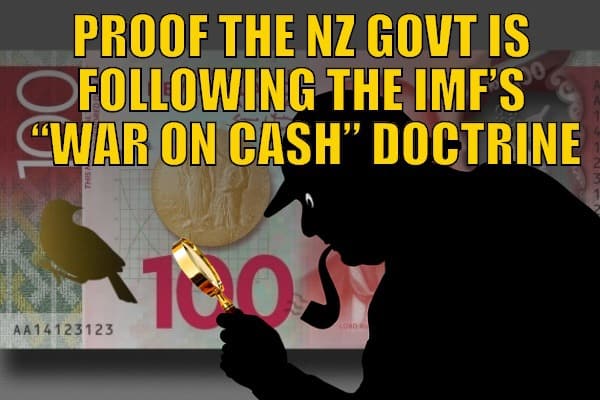New Financial Reporting Rules in New Zealand: Just Following IMF War on Cash Doctrine
We have a new theory for you this week as to what the real reason is behind the newly announced financial reporting rules here in New Zealand.
A few weeks ago we took a look at the new financial reporting rules that are set to come into force in New Zealand later this year.
New Financial Reporting Rules: First Step to Capital Controls in New Zealand?
“New Banking rules set to come into force in November will mean any cash transactions over $10,000 will have to be reported to police by New Zealand banks.
On top of this banks will also have to alert the Police Financial Intelligence Unit of all international wire transfers from New Zealand of only $1000 or more.”
 We also pondered whether this might in fact be the first step in implementing capital controls in New Zealand.
We also pondered whether this might in fact be the first step in implementing capital controls in New Zealand.
However an article we stumbled across this week shows a much more likely rationale behind these moves.
That is these financial reporting rules are actually just further steps in the global war on cash. And that the New Zealand government is merely following along on a pre-ordained path set by the IMF.
How did we reach this conclusion?
With the help of an article from Norbert Häring titled:
IMF tells governments how to subvert public resistance against elimination of cash
“The International Monetary Fund (IMF) in Washington has published a Working Paper on “de-cashing”. It gives advice to governments who want to abolish cash against the will of their citizenry. Move slowly, start with harmless seeming measures, is part of that advice.
In “The Macroeconomics of De-Cashing”, IMF-Analyst Alexei Kireyev recommends in his conclusions:
“Although some countries most likely will de-cash in a few years, going completely cashless should be phased in steps. The de-cashing process could build on the initial and largely uncontested steps, such as the phasing out of large denomination bills, the placement of ceilings on cash transactions, and the reporting of cash moves across the borders. Further steps could include creating economic incentives to reduce the use of cash in transactions, simplifying the opening and use of transferrable deposits, and further computerizing the financial system.”
The key sentence to pay attention to is this one:
“The de-cashing process could build on the initial and largely uncontested steps, such as the phasing out of large denomination bills, the placement of ceilings on cash transactions, and the reporting of cash moves across the borders.”
We are yet to hear too much discussion by anyone in government of the phasing out of the $100 note here in New Zealand. Although we did share one report on this a few weeks ago: Support Building to Abolish NZ$100 Note
But how about the other 2 parts of the IMF analyst’s recommendations on “de-cashing” (a “friendly” name for the war on cash)?
1. The placement of ceilings on cash transactions.
Hmmm. That sounds an awful lot like any cash transactions over $10,000 needing to be reported to police by New Zealand banks doesn’t it?
2. The reporting of cash moves across the borders
That’s exactly what banks will have to do in alerting the Police Financial Intelligence Unit of all international wire transfers from New Zealand of only $1000 or more.
So it appears these new financial reporting rules to be put in place here in New Zealand are following the IMF script almost perfectly.
Perhaps not surprisingly as the IMF paper also discusses the importance of these changes being implemented globally in a co-ordinated manner:
“Coordinated efforts on de-cashing could help enhance its positive effects and reduce potential costs. At least at the level of major countries and their currencies, the authorities could coordinate their de-cashing efforts. Such coordinated efforts are, in particular, important in the decisions to phase out large denomination bills for all major currencies, to use ceilings and other restrictions on cash transactions, and to introduce the reporting requirements for cash transactions or their taxation. For currency areas, a single decashing policy would be clearly preferable to a national one.”
This is another warning that the government here in New Zealand is also looking to remove cash from the New Zealand financial system as well. They are following the IMF doctrine just as every other western nation seems to be. It’s likely we will just slowly see these changes implemented. With the aim being that we won’t notice when cash is no longer available for use. Much the like the proverbial frog in a pot of slowly heating water.
Just another reason to be sure you have some money “outside” the financial system. If you’d like a quote to get some gold or silver bullion which are the only financial assets that are not someone else’s liability then go here.
(If you’d like some assistance with timing your entry into and your eventual exit from gold and silver, then you may want to meet our “secret” investment advisor. You can learn more about who he is… And how you could benefit from his uncanny ability to enter and exit not just the precious metals markets but many other markets too, at just the right time. So go here to learn more now.)
Related content you might like to read: War on Cash – Implications for New Zealand



Pingback: RBNZ Cryptocurrency to Replace NZ Physical Currency with a Digital Alternative? - Gold Survival Guide
Pingback: Update on the War on Cash: Australia Moving to Cashless Society? + RBNZ on Digital Currency - Gold Survival Guide
Pingback: Visa Ups the War on Cash + How Governments Can Kill Cash - Gold Survival Guide
Pingback: IMF Says NZ Needs Bank Depositor Haircut Exemption of $10,000 - Gold Survival Guide
Pingback: NZ Gold Coins (and Silver Coins) or NZ Gold Bars (and Silver Bars): Which Should I Buy?